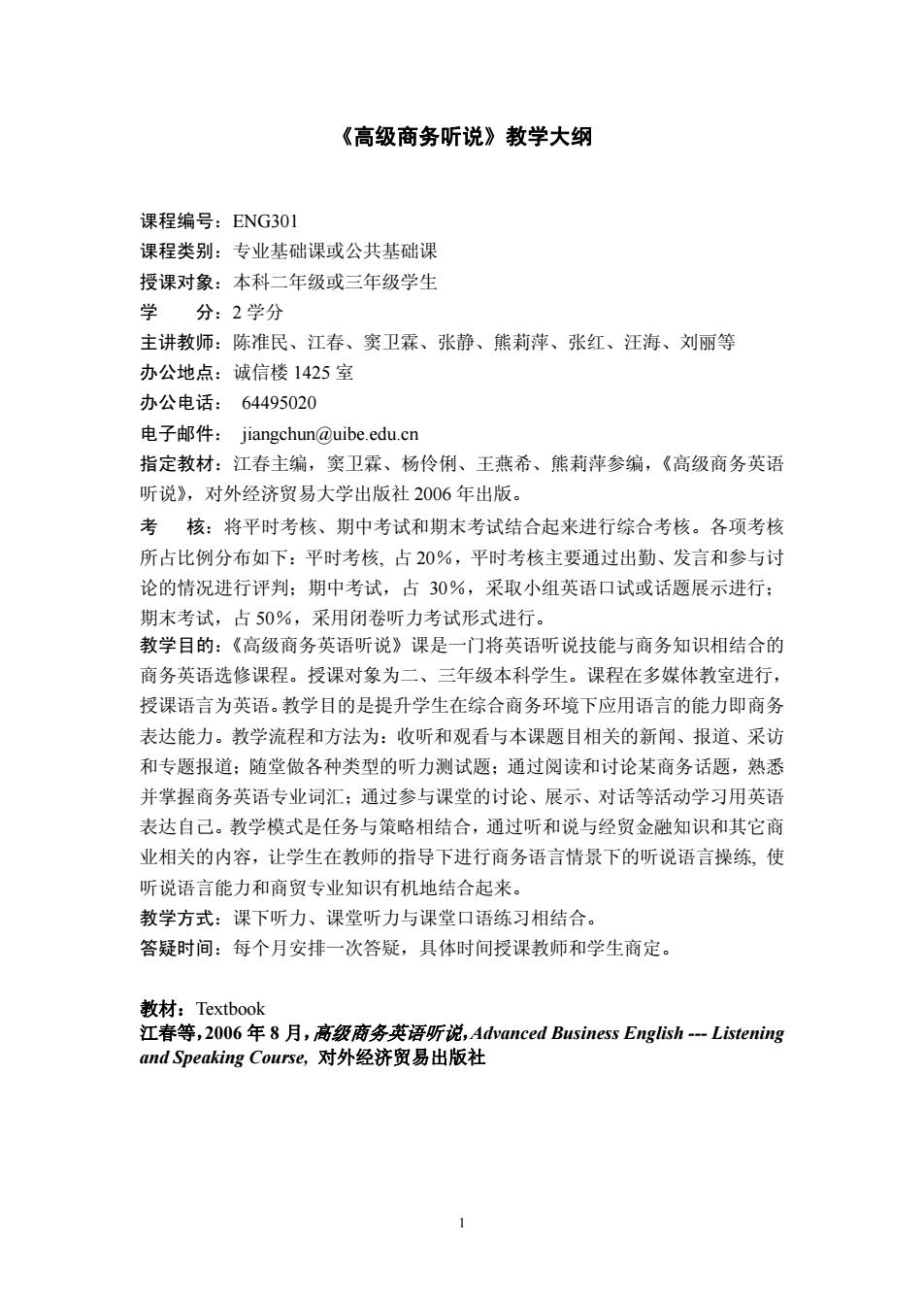
《高级商务听说》教学大纲 课程编号:ENG301 课程类别:专业基础课或公共基础课 授课对象:本科二年级或三年级学生 学分:2学分 主讲教师:陈准民、江春、窦卫霖、张静、熊莉萍、张红、汪海、刘丽等 办公地点:诚信楼1425室 办公电话:64495020 电子邮件:jiangchun@uibe.edu.cn 指定教材:江春主编,窦卫霖、杨伶俐、王燕希、熊莉萍参编,《高级商务英语 听说》,对外经济贸易大学出版社2006年出版。 考核:将平时考核、期中考试和期末考试结合起来进行综合考核。各项考核 所占比例分布如下:平时考核,占20%,平时考核主要通过出勤、发言和参与讨 论的情况进行评判;期中考试,占30%,采取小组英语口试或话题展示进行: 期末考试,占50%,采用闭卷听力考试形式进行。 教学目的:《高级商务英语听说》课是一门将英语听说技能与商务知识相结合的 商务英语选修课程。授课对象为二、三年级本科学生。课程在多媒体教室进行, 授课语言为英语。教学目的是提升学生在综合商务环境下应用语言的能力即商务 表达能力。教学流程和方法为:收听和观看与本课题目相关的新闻、报道、采访 和专题报道:随堂做各种类型的听力测试题;通过阅读和讨论某商务话题,熟悉 并掌握商务英语专业词汇:通过参与课堂的讨论、展示、对话等活动学习用英语 表达自己。教学模式是任务与策略相结合,通过听和说与经贸金融知识和其它商 业相关的内容,让学生在教师的指导下进行商务语言情景下的听说语言操练,使 听说语言能力和商贸专业知识有机地结合起来。 教学方式:课下听力、课堂听力与课堂口语练习相结合。 答疑时间:每个月安排一次答疑,具体时间授课教师和学生商定。 教材:Textbook 江春等,2006年8月,高级商务英语听说,Advanced Business English--Listening and Speaking Course,,对外经济贸易出版社
《高级商务听说》教学大纲 课程编号:ENG301 课程类别:专业基础课或公共基础课 授课对象:本科二年级或三年级学生 学 分:2 学分 主讲教师:陈准民、江春、窦卫霖、张静、熊莉萍、张红、汪海、刘丽等 办公地点:诚信楼 1425 室 办公电话: 64495020 电子邮件: jiangchun@uibe.edu.cn 指定教材:江春主编,窦卫霖、杨伶俐、王燕希、熊莉萍参编,《高级商务英语 听说》,对外经济贸易大学出版社 2006 年出版。 考 核:将平时考核、期中考试和期末考试结合起来进行综合考核。各项考核 所占比例分布如下:平时考核, 占 20%,平时考核主要通过出勤、发言和参与讨 论的情况进行评判;期中考试,占 30%,采取小组英语口试或话题展示进行; 期末考试,占 50%,采用闭卷听力考试形式进行。 教学目的:《高级商务英语听说》课是一门将英语听说技能与商务知识相结合的 商务英语选修课程。授课对象为二、三年级本科学生。课程在多媒体教室进行, 授课语言为英语。教学目的是提升学生在综合商务环境下应用语言的能力即商务 表达能力。教学流程和方法为:收听和观看与本课题目相关的新闻、报道、采访 和专题报道;随堂做各种类型的听力测试题;通过阅读和讨论某商务话题,熟悉 并掌握商务英语专业词汇;通过参与课堂的讨论、展示、对话等活动学习用英语 表达自己。教学模式是任务与策略相结合,通过听和说与经贸金融知识和其它商 业相关的内容,让学生在教师的指导下进行商务语言情景下的听说语言操练, 使 听说语言能力和商贸专业知识有机地结合起来。 教学方式:课下听力、课堂听力与课堂口语练习相结合。 答疑时间:每个月安排一次答疑,具体时间授课教师和学生商定。 教材:Textbook 江春等,2006 年 8 月,高级商务英语听说,Advanced Business English --- Listening and Speaking Course, 对外经济贸易出版社 1
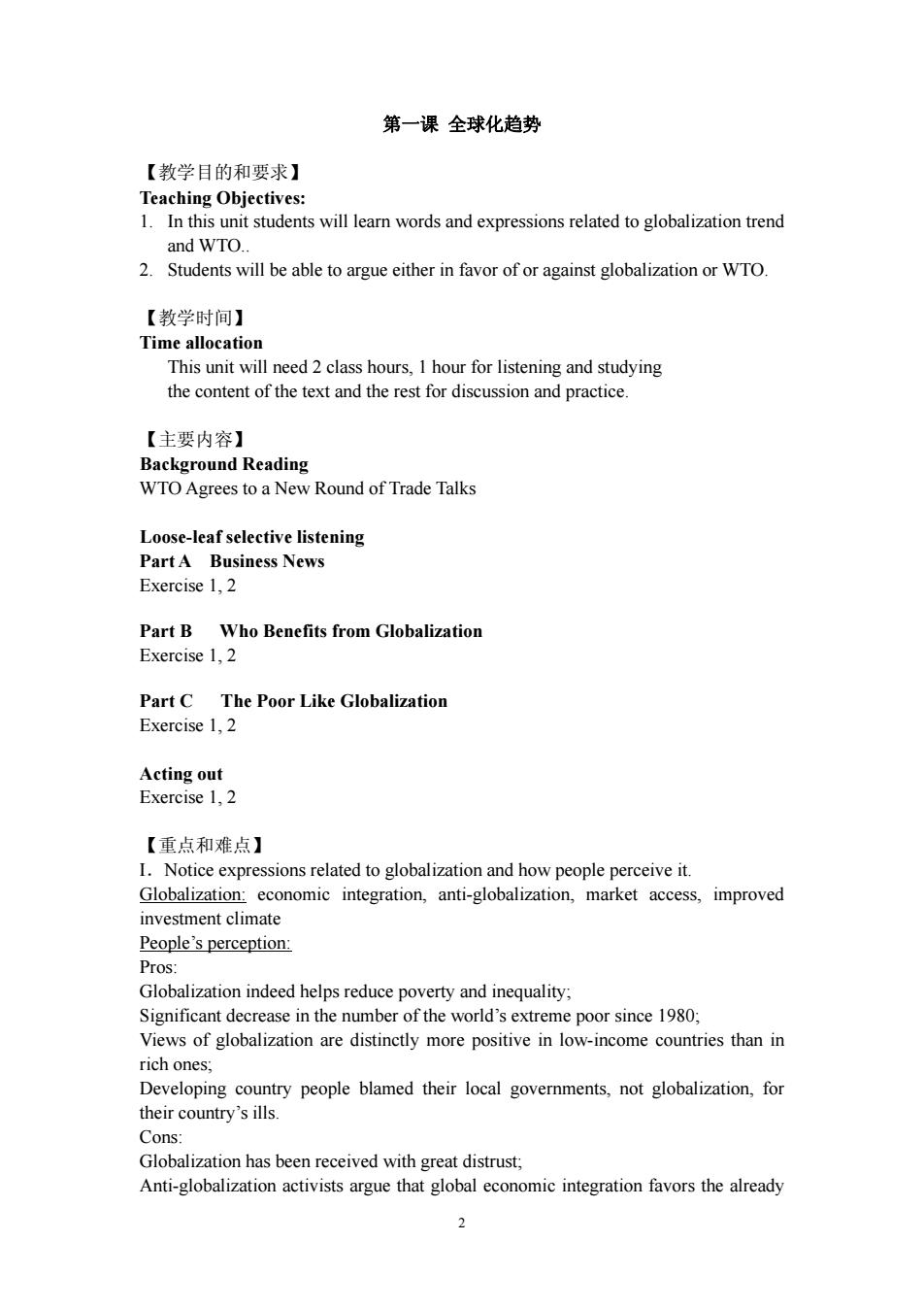
第一课全球化趋势 【教学目的和要求】 Teaching Objectives: 1.In this unit students will learn words and expressions related to globalization trend and WTO. 2.Students will be able to argue either in favor of or against globalization or WTO. 【教学时间】 Time allocation This unit will need 2 class hours,I hour for listening and studying the content of the text and the rest for discussion and practice. 【主要内容】 Background Reading WTO Agrees to a New Round of Trade Talks Loose-leaf selective listening Part A Business News Exercise 1,2 Part B Who Benefits from Globalization Exercise 1,2 Part C The Poor Like Globalization Exercise 1,2 Acting out Exercise 1,2 【重点和难点】 I.Notice expressions related to globalization and how people perceive it. Globalization:economic integration,anti-globalization,market access,improved investment climate People's perception: Pros: Globalization indeed helps reduce poverty and inequality; Significant decrease in the number of the world's extreme poor since 1980; Views of globalization are distinctly more positive in low-income countries than in rich ones; Developing country people blamed their local governments,not globalization,for their country's ills. Cons: Globalization has been received with great distrust; Anti-globalization activists argue that global economic integration favors the already 2
第一课 全球化趋势 【教学目的和要求】 Teaching Objectives: 1. In this unit students will learn words and expressions related to globalization trend and WTO.. 2. Students will be able to argue either in favor of or against globalization or WTO. 【教学时间】 Time allocation This unit will need 2 class hours, 1 hour for listening and studying the content of the text and the rest for discussion and practice. 【主要内容】 Background Reading WTO Agrees to a New Round of Trade Talks Loose-leaf selective listening Part A Business News Exercise 1, 2 Part B Who Benefits from Globalization Exercise 1, 2 Part C The Poor Like Globalization Exercise 1, 2 Acting out Exercise 1, 2 【重点和难点】 I.Notice expressions related to globalization and how people perceive it. Globalization: economic integration, anti-globalization, market access, improved investment climate People’s perception: Pros: Globalization indeed helps reduce poverty and inequality; Significant decrease in the number of the world’s extreme poor since 1980; Views of globalization are distinctly more positive in low-income countries than in rich ones; Developing country people blamed their local governments, not globalization, for their country’s ills. Cons: Globalization has been received with great distrust; Anti-globalization activists argue that global economic integration favors the already 2
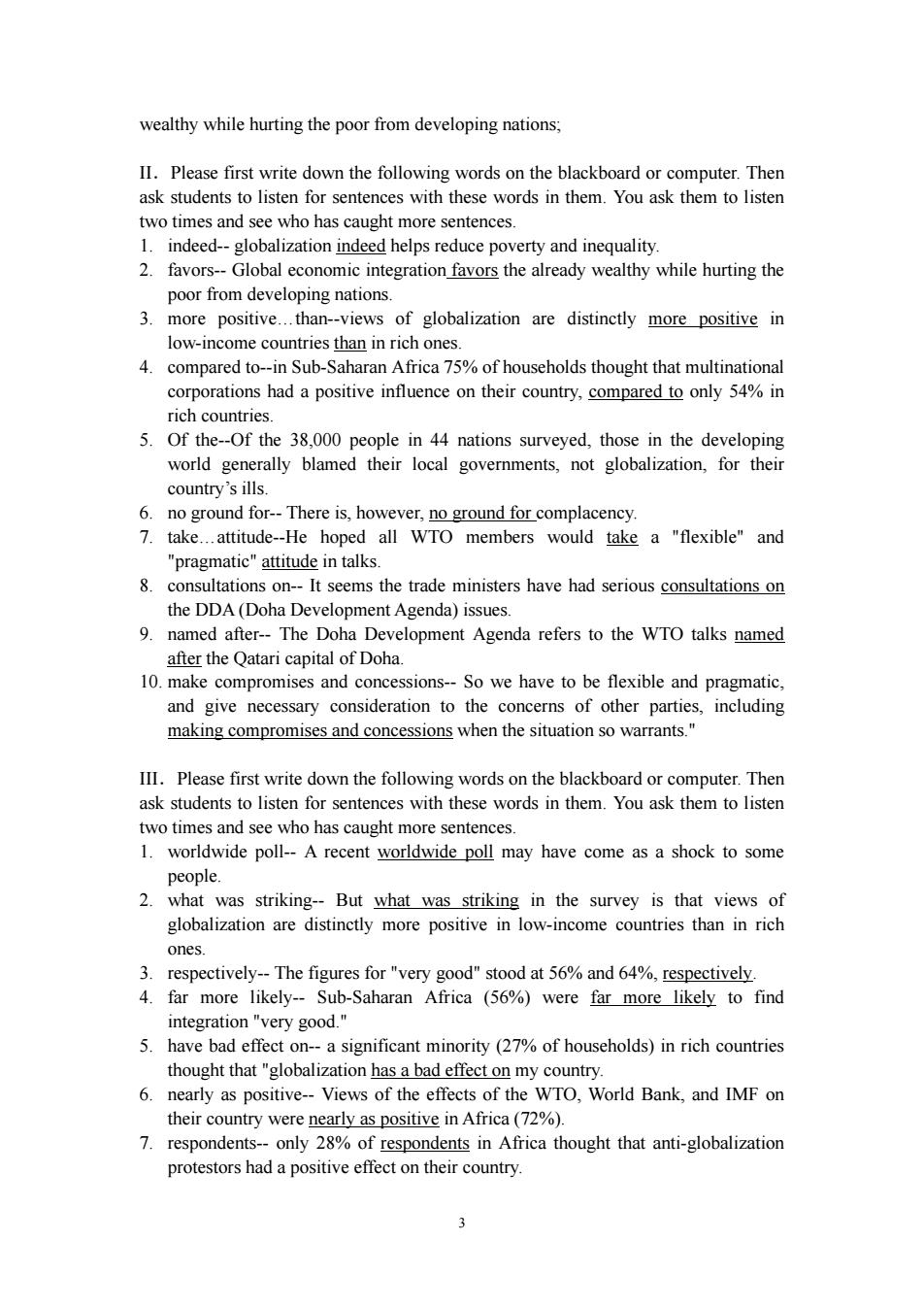
wealthy while hurting the poor from developing nations; II.Please first write down the following words on the blackboard or computer.Then ask students to listen for sentences with these words in them.You ask them to listen two times and see who has caught more sentences. 1.indeed--globalization indeed helps reduce poverty and inequality 2.favors--Global economic integration favors the already wealthy while hurting the poor from developing nations. 3.more positive...than--views of globalization are distinctly more positive in low-income countries than in rich ones. 4.compared to--in Sub-Saharan Africa 75%of households thought that multinational corporations had a positive influence on their country,compared to only 54%in rich countries. 5.Of the--Of the 38,000 people in 44 nations surveyed,those in the developing world generally blamed their local governments,not globalization,for their country's ills. 6.no ground for--There is,however,no ground for complacency. 7.take...attitude--He hoped all WTO members would take a "flexible"and "pragmatic"attitude in talks. 8.consultations on--It seems the trade ministers have had serious consultations on the DDA(Doha Development Agenda)issues. 9.named after--The Doha Development Agenda refers to the WTO talks named after the Qatari capital of Doha. 10.make compromises and concessions--So we have to be flexible and pragmatic, and give necessary consideration to the concerns of other parties,including making compromises and concessions when the situation so warrants." III.Please first write down the following words on the blackboard or computer.Then ask students to listen for sentences with these words in them.You ask them to listen two times and see who has caught more sentences. 1.worldwide poll--A recent worldwide poll may have come as a shock to some people. 2.what was striking--But what was striking in the survey is that views of globalization are distinctly more positive in low-income countries than in rich ones. 3.respectively--The figures for "very good"stood at 56%and 64%,respectively. 4.far more likely--Sub-Saharan Africa (56%)were far more likely to find integration "very good." 5.have bad effect on--a significant minority (27%of households)in rich countries thought that "globalization has a bad effect on my country. 6.nearly as positive--Views of the effects of the WTO,World Bank,and IMF on their country were nearly as positive in Africa(72%). 7.respondents--only 28%of respondents in Africa thought that anti-globalization protestors had a positive effect on their country
wealthy while hurting the poor from developing nations; II.Please first write down the following words on the blackboard or computer. Then ask students to listen for sentences with these words in them. You ask them to listen two times and see who has caught more sentences. 1. indeed-- globalization indeed helps reduce poverty and inequality. 2. favors-- Global economic integration favors the already wealthy while hurting the poor from developing nations. 3. more positive…than--views of globalization are distinctly more positive in low-income countries than in rich ones. 4. compared to--in Sub-Saharan Africa 75% of households thought that multinational corporations had a positive influence on their country, compared to only 54% in rich countries. 5. Of the--Of the 38,000 people in 44 nations surveyed, those in the developing world generally blamed their local governments, not globalization, for their country’s ills. 6. no ground for-- There is, however, no ground for complacency. 7. take…attitude--He hoped all WTO members would take a "flexible" and "pragmatic" attitude in talks. 8. consultations on-- It seems the trade ministers have had serious consultations on the DDA (Doha Development Agenda) issues. 9. named after-- The Doha Development Agenda refers to the WTO talks named after the Qatari capital of Doha. 10. make compromises and concessions-- So we have to be flexible and pragmatic, and give necessary consideration to the concerns of other parties, including making compromises and concessions when the situation so warrants." III.Please first write down the following words on the blackboard or computer. Then ask students to listen for sentences with these words in them. You ask them to listen two times and see who has caught more sentences. 1. worldwide poll-- A recent worldwide poll may have come as a shock to some people. 2. what was striking-- But what was striking in the survey is that views of globalization are distinctly more positive in low-income countries than in rich ones. 3. respectively-- The figures for "very good" stood at 56% and 64%, respectively. 4. far more likely-- Sub-Saharan Africa (56%) were far more likely to find integration "very good." 5. have bad effect on-- a significant minority (27% of households) in rich countries thought that "globalization has a bad effect on my country. 6. nearly as positive-- Views of the effects of the WTO, World Bank, and IMF on their country were nearly as positive in Africa (72%). 7. respondents-- only 28% of respondents in Africa thought that anti-globalization protestors had a positive effect on their country. 3
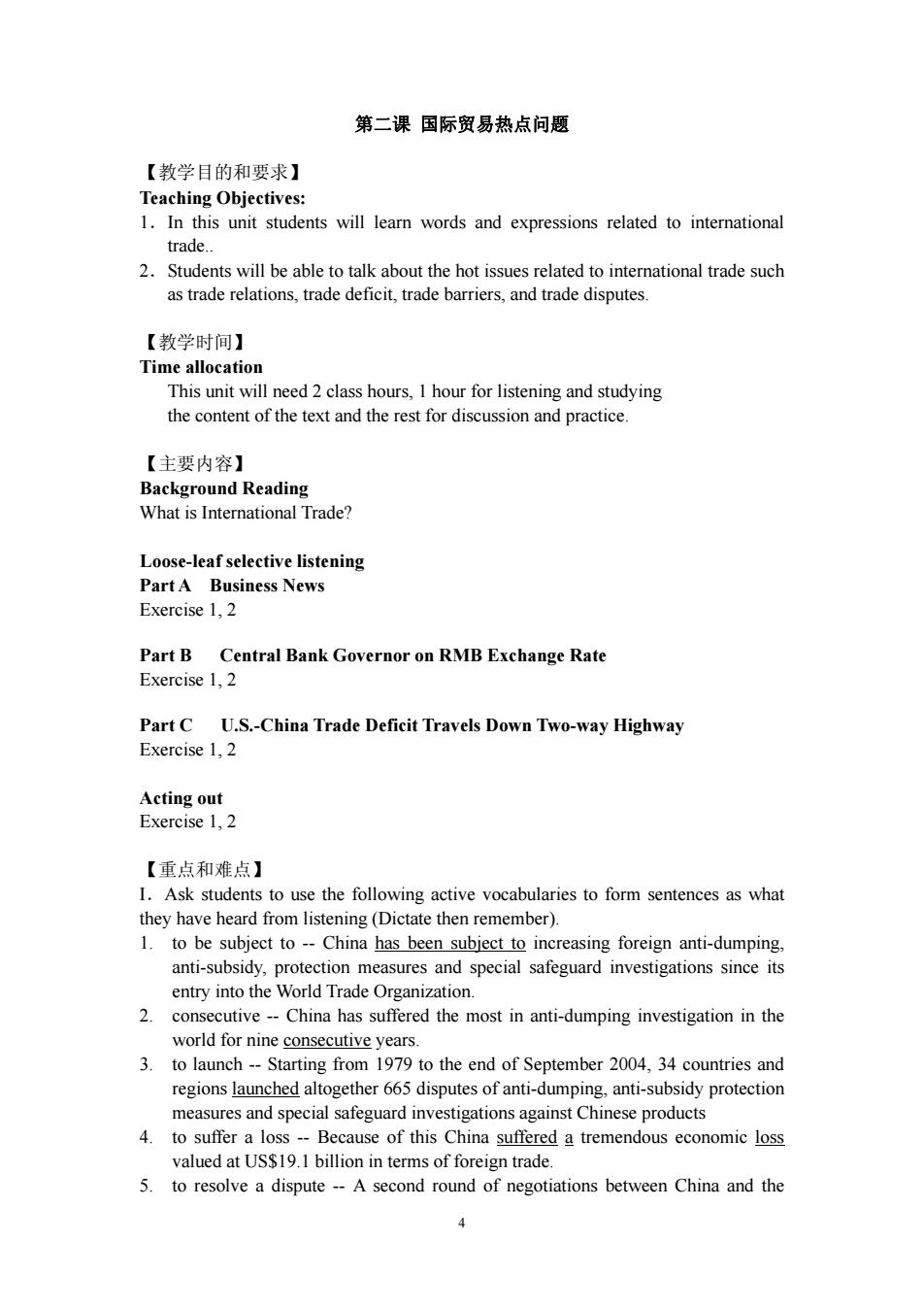
第二课国际贸易热点问题 【教学目的和要求】 Teaching Objectives: 1.In this unit students will learn words and expressions related to international trade.. 2.Students will be able to talk about the hot issues related to international trade such as trade relations,trade deficit,trade barriers,and trade disputes. 【教学时间】 Time allocation This unit will need 2 class hours,1 hour for listening and studying the content of the text and the rest for discussion and practice. 【主要内容】 Background Reading What is International Trade? Loose-leaf selective listening Part A Business News Exercise 1,2 Part B Central Bank Governor on RMB Exchange Rate Exercise 1,2 Part C U.S.-China Trade Deficit Travels Down Two-way Highway Exercise 1,2 Acting out Exercise 1,2 【重点和难点】 I.Ask students to use the following active vocabularies to form sentences as what they have heard from listening(Dictate then remember). 1.to be subject to--China has been subject to increasing foreign anti-dumping, anti-subsidy,protection measures and special safeguard investigations since its entry into the World Trade Organization. 2. consecutive--China has suffered the most in anti-dumping investigation in the world for nine consecutive years. 3.to launch--Starting from 1979 to the end of September 2004,34 countries and regions launched altogether 665 disputes of anti-dumping,anti-subsidy protection measures and special safeguard investigations against Chinese products 4.to suffer a loss --Because of this China suffered a tremendous economic loss valued at US$19.1 billion in terms of foreign trade. 5.to resolve a dispute --A second round of negotiations between China and the
第二课 国际贸易热点问题 【教学目的和要求】 Teaching Objectives: 1.In this unit students will learn words and expressions related to international trade.. 2.Students will be able to talk about the hot issues related to international trade such as trade relations, trade deficit, trade barriers, and trade disputes. 【教学时间】 Time allocation This unit will need 2 class hours, 1 hour for listening and studying the content of the text and the rest for discussion and practice. 【主要内容】 Background Reading What is International Trade? Loose-leaf selective listening Part A Business News Exercise 1, 2 Part B Central Bank Governor on RMB Exchange Rate Exercise 1, 2 Part C U.S.-China Trade Deficit Travels Down Two-way Highway Exercise 1, 2 Acting out Exercise 1, 2 【重点和难点】 I.Ask students to use the following active vocabularies to form sentences as what they have heard from listening (Dictate then remember). 1. to be subject to -- China has been subject to increasing foreign anti-dumping, anti-subsidy, protection measures and special safeguard investigations since its entry into the World Trade Organization. 2. consecutive -- China has suffered the most in anti-dumping investigation in the world for nine consecutive years. 3. to launch -- Starting from 1979 to the end of September 2004, 34 countries and regions launched altogether 665 disputes of anti-dumping, anti-subsidy protection measures and special safeguard investigations against Chinese products 4. to suffer a loss -- Because of this China suffered a tremendous economic loss valued at US$19.1 billion in terms of foreign trade. 5. to resolve a dispute -- A second round of negotiations between China and the 4
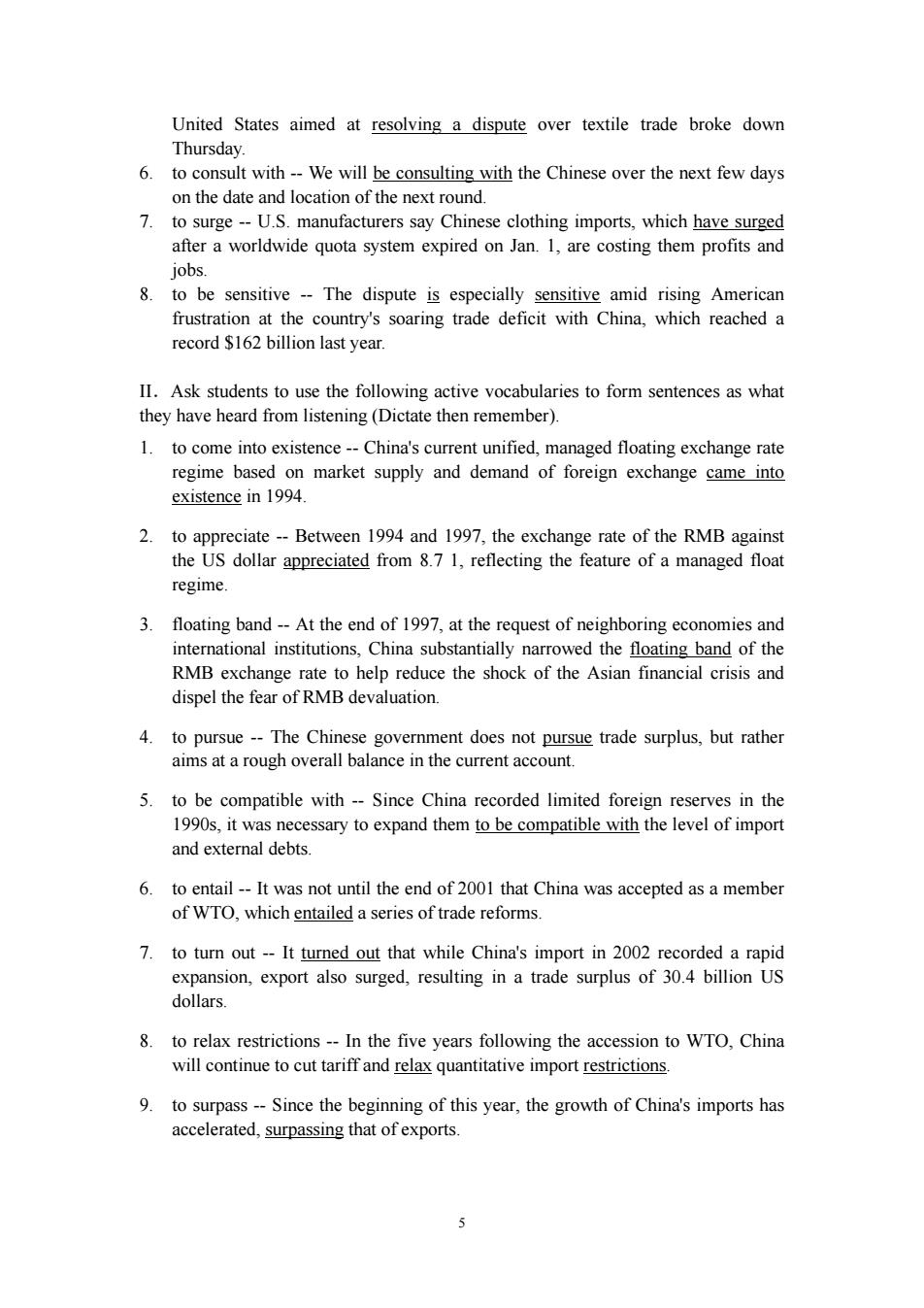
United States aimed at resolving a dispute over textile trade broke down Thursday. 6.to consult with--We will be consulting with the Chinese over the next few days on the date and location of the next round. 7.to surge--U.S.manufacturers say Chinese clothing imports,which have surged after a worldwide quota system expired on Jan.1,are costing them profits and jobs. 8.to be sensitive --The dispute is especially sensitive amid rising American frustration at the country's soaring trade deficit with China,which reached a record $162 billion last year. II.Ask students to use the following active vocabularies to form sentences as what they have heard from listening(Dictate then remember). 1.to come into existence--China's current unified,managed floating exchange rate regime based on market supply and demand of foreign exchange came into existence in 1994. 2.to appreciate--Between 1994 and 1997,the exchange rate of the RMB against the US dollar appreciated from 8.7 1,reflecting the feature of a managed float regime 3.floating band--At the end of 1997,at the request of neighboring economies and international institutions,China substantially narrowed the floating band of the RMB exchange rate to help reduce the shock of the Asian financial crisis and dispel the fear of RMB devaluation. 4.to pursue--The Chinese government does not pursue trade surplus,but rather aims at a rough overall balance in the current account. 5.to be compatible with--Since China recorded limited foreign reserves in the 1990s,it was necessary to expand them to be compatible with the level of import and external debts. 6.to entail--It was not until the end of 2001 that China was accepted as a member of WTO,which entailed a series of trade reforms. 7.to turn out--It turned out that while China's import in 2002 recorded a rapid expansion,export also surged,resulting in a trade surplus of 30.4 billion US dollars. 8.to relax restrictions--In the five years following the accession to WTO,China will continue to cut tariff and relax quantitative import restrictions. 9.to surpass--Since the beginning of this year,the growth of China's imports has accelerated,surpassing that of exports
United States aimed at resolving a dispute over textile trade broke down Thursday. 6. to consult with -- We will be consulting with the Chinese over the next few days on the date and location of the next round. 7. to surge -- U.S. manufacturers say Chinese clothing imports, which have surged after a worldwide quota system expired on Jan. 1, are costing them profits and jobs. 8. to be sensitive -- The dispute is especially sensitive amid rising American frustration at the country's soaring trade deficit with China, which reached a record $162 billion last year. II.Ask students to use the following active vocabularies to form sentences as what they have heard from listening (Dictate then remember). 1. to come into existence -- China's current unified, managed floating exchange rate regime based on market supply and demand of foreign exchange came into existence in 1994. 2. to appreciate -- Between 1994 and 1997, the exchange rate of the RMB against the US dollar appreciated from 8.7 1, reflecting the feature of a managed float regime. 3. floating band -- At the end of 1997, at the request of neighboring economies and international institutions, China substantially narrowed the floating band of the RMB exchange rate to help reduce the shock of the Asian financial crisis and dispel the fear of RMB devaluation. 4. to pursue -- The Chinese government does not pursue trade surplus, but rather aims at a rough overall balance in the current account. 5. to be compatible with -- Since China recorded limited foreign reserves in the 1990s, it was necessary to expand them to be compatible with the level of import and external debts. 6. to entail -- It was not until the end of 2001 that China was accepted as a member of WTO, which entailed a series of trade reforms. 7. to turn out -- It turned out that while China's import in 2002 recorded a rapid expansion, export also surged, resulting in a trade surplus of 30.4 billion US dollars. 8. to relax restrictions -- In the five years following the accession to WTO, China will continue to cut tariff and relax quantitative import restrictions. 9. to surpass -- Since the beginning of this year, the growth of China's imports has accelerated, surpassing that of exports. 5